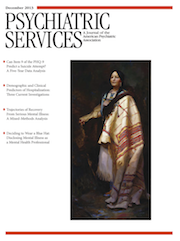The Recovery Group Project: Development of an Intervention Led Jointly by Peer and Professional Counselors
Abstract
Objective
The objective of this study was to develop and evaluate a low-cost, strengths-based group intervention led jointly by peer counselors and professional counselors to foster recovery among adults with serious mental illnesses.
Methods
Cohort 1 included development of materials and a feasibility pilot, with participants recruited from community mental health centers (CMHCs). Cohorts 2 and 3 included a small randomized controlled trial with participants recruited from members of a not-for-profit, integrated health plan. Cohorts 4 and 5 involved evaluation of the most appropriate length for the intervention with a pre-post design that allowed intervention length to vary between 12 and 18 sessions; participants and peer leaders were recruited from two CMHCs (N=82).
Results
Participants were very satisfied with the recovery-focused group intervention, preferred a greater number of weekly sessions (17 or 18 sessions), and reported improved outcomes across multiple domains.
Conclusions
Using peer-developed materials and a combination of peer and professional counselors as group leaders is feasible to offer and valuable to participants. Outcomes measures suggest that the intervention has potential to facilitate recovery in multiple domains.



